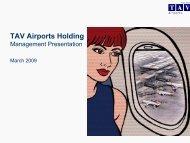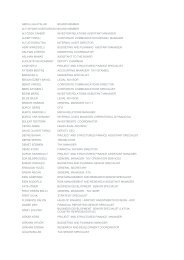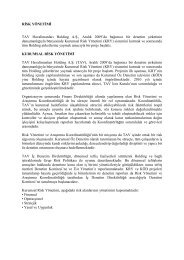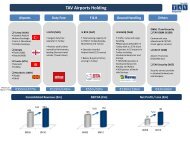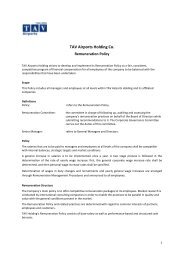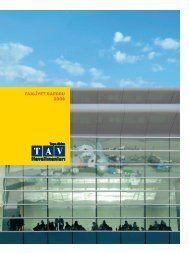TAV IT
TAV IT
TAV IT
You also want an ePaper? Increase the reach of your titles
YUMPU automatically turns print PDFs into web optimized ePapers that Google loves.
144<br />
<strong>TAV</strong> Airports Holding Annual Report 2008<br />
<strong>TAV</strong> AIRPORTS HOLDING AND <strong>IT</strong>S SUBSIDIARIES<br />
NOTES TO THE CONSOLIDATED FINANCIAL STATEMENTS<br />
AS AT AND FOR THE YEAR ENDED 31 DECEMBER 2008<br />
(Amounts expressed in Euro unless otherwise stated)<br />
r) New standards and interpretations not yet adopted<br />
A number of new standards, amendments to standards and interpretations are not yet effective for the year ended 31 December<br />
2008, and have not been applied in preparing these consolidated financial statements:<br />
• IFRS 8 “Operating Segments” introduces the “management approach” to segment reporting. IFRS 8, which becomes mandatory<br />
for the Group’s 2009 consolidated financial statements, will require the disclosure of segment information based on the internal<br />
reports regularly reviewed by the Group’s Chief Operating Decision Maker in order to assess each segment’s performance and<br />
to allocate resources to them. Currently the Group presents segment information in respect of its business and geographical<br />
segments (see note 6).<br />
• Revised IAS 23 “Borrowing Costs” removes the option to expense borrowing costs and requires that an entity capitalize borrowing<br />
costs directly attributable to the acquisition, construction or production of a qualifying asset as a part of the cost of that asset.<br />
The revised IAS 23 will become mandatory for the Group’s 2009 consolidated financial statements and the Group is currently<br />
assessing the impact of the amended standard on its consolidated financial statements.<br />
• Revised IFRS 3 “Business Combinations” (2008) incorporates the following changes that are likely to be relevant to the Group’s<br />
operations:<br />
– The definition of a business has been broadened, which may result in more acquisitions being treated as business combinations.<br />
– Contingent consideration will be measured at fair value, with subsequent changes in fair value recognised in profit or loss.<br />
– Transaction costs, other than share and debt issue costs, will be expensed as incurred.<br />
– Any pre-existing interest in an acquiree will be measured at fair value, with the related gain or loss recognised in profit or loss.<br />
– Any non-controlling (minority) interest will be measured at either fair value, or at its proportionate interest in the identifiable<br />
assets and liabilities of an acquiree, on a transaction-by-transaction basis.<br />
Revised IFRS 3, which becomes mandatory for the Group’s 2010 consolidated financial statements, will be applied prospectively<br />
and therefore there will be no impact on prior periods in the Group’s 2010 consolidated financial statements.<br />
• Amended IAS 27 “Consolidated and Separate Financial Statements” (2008) requires accounting for changes in ownership interests<br />
by the Group in a subsidiary, while maintaining control, to be recognised as an equity transaction. When the Group loses control of<br />
a subsidiary, any interest retained in the former subsidiary will be measured at fair value with the gain or loss recognised in profit<br />
or loss. The amendments to IAS 27, which become mandatory for the Group’s 2010 consolidated financial statements, are not<br />
expected to have a significant impact on the consolidated financial statements.<br />
• Amendment to IFRS 2 “Share-based Payment-Vesting Conditions and Cancellations” clarifies the definition of vesting conditions,<br />
introduces the concept of non vesting conditions, requires non-vesting conditions to be reflected in grant date fair value and<br />
provides the accounting treatment for non-vesting conditions and cancellations. The amendments to IFRS 2 is effective<br />
for annual periods beginning on or after 1 January 2009, will become mandatory for the Group’s 2009 consolidated financial<br />
statements, with retrospective application and is not expected to have any effect on the consolidated financial statements.<br />
• Amendments to IAS 32 “Financial Instruments: Presentation and IAS 1 Presentation of Financial Statements-Puttable Financial<br />
Instruments and Obligations Arising on Liquidation” require puttable instruments and instruments that impose on the entity<br />
an obligation to deliver to another party a pro rata share of the net assets of the entity only on liquidation to be classified as<br />
equity if certain conditions are met. The amendments, which become mandatory for the Group’s 2009 consolidated financial<br />
statements with retrospective application required, are not expected to have any significant impact on the consolidated financial<br />
statements.



